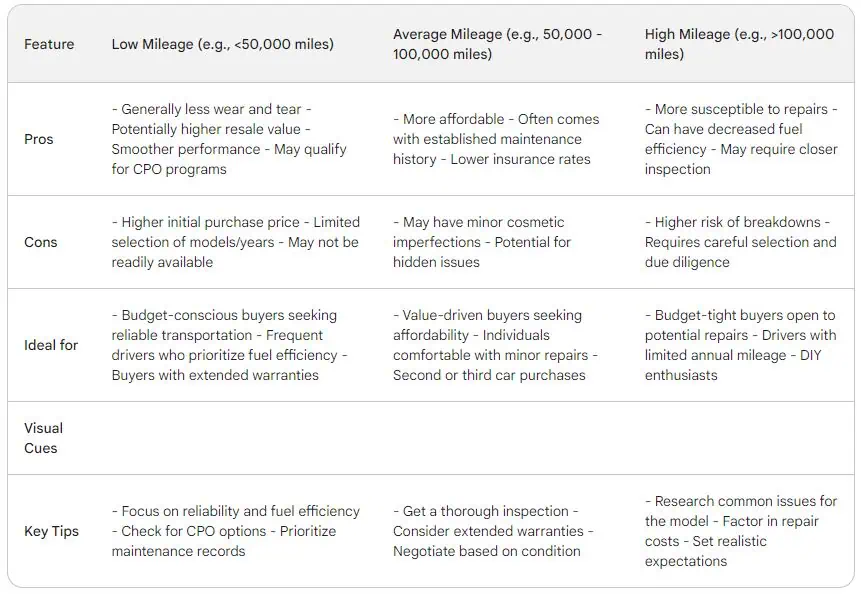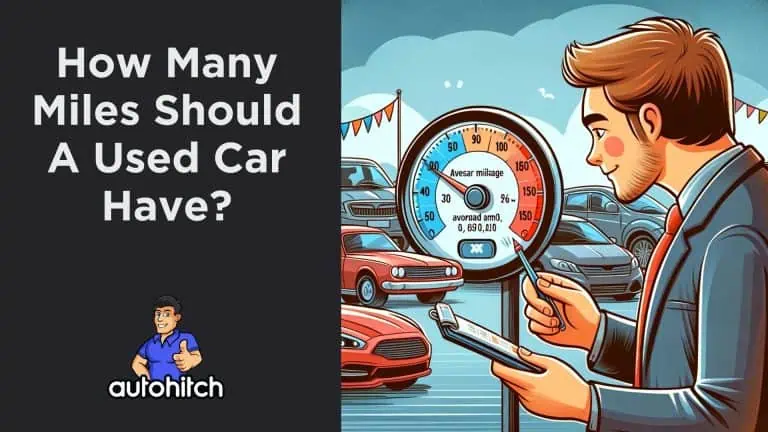The simple way to determine if a car has too many miles is to take the current mileage and divide it by the age of the vehicle. The resulting number will be the average amount of miles the car was driven each each year. If that number is higher than 15k, then that vehicle was driven more than the average person drives a car each year and it could be said: “That car has too many miles.”
However, this isn’t the entire story!
As a former licensed dealer who bought and sold thousands of used cars, I can attest that more goes into determining if a used car has “good” mileage than simply reading the odometer.
I created the guide below based on my experience to lay out exactly how to examine a car by its mileage deeper than simply looking at the odometer reading.
Related Articles to Read:
- What To Look For When Buying A Used Car
- How To Negotiate Used Car Price
- How Much Do Dealers Markup Used Cars
- How Much Will Dealers Come Down on a Used Car?
- How Much Is My Car Worth
Table of Contents
Average Annual Mileage: A Rule of Thumb
The average driver travels 12,000 to 15,000 miles per year. ThisStatistic can provide a baseline for estimating expected mileage by a used vehicle’s age:
- A 5-year-old used car should have about 60,000 to 75,000 miles.
- A 10-year-old used car should have about 120,000 to 150,000 miles.
Deviations above or below these averages for a car’s age could indicate issues:
- Significantly more miles likely means heavy use and more wear and tear.
- Exceptionally low miles might mean infrequent driving. This can also cause problems as parts degrade over time, regardless of use.
However, remember that mileage averages are general guidelines, not definitive cutoffs. Many factors beyond mileage influence mechanical condition and value retention.
Mileage Guidelines by Vehicle Type
Ideal mileage ranges can vary substantially between vehicle types based on typical lifespan:
| Vehicle Type | Good Mileage Range |
|---|---|
| Sedans/SUVs | Up to 100k miles in good condition |
| Trucks (gas) | Under 150k miles |
| Trucks (diesel) | Up to 250k miles |
| Sports Cars | Under 100k miles |
Sports cars tend to experience more wear from aggressive driving. Trucks and diesel vehicles often exceed 200,000+ miles if properly maintained. Well-maintained sedans can reliably drive 100k+ miles as well.
Again, these are generalizations – a sports car with 150k highway miles may be preferable to one with 50k hard city miles.
Key Tradeoffs by Mileage Range

Key Factors Beyond Mileage
A used car’s mechanical health depends on more than the odometer reading. Be sure to examine:
- Maintenance history – Regular oil changes, tune-ups, etc., prolong engine/transmission lifespan. Request records.
- Driving conditions – Stop-and-go city driving causes more strain than steady highway usage.
- Location history – Cars from snowy regions experience more corrosion than those from warm climates. Run a vehicle history report.
- Collision history – Minor accidents don’t necessarily impact the condition if properly repaired. Check for frame/unibody damage.
- Owner history – More owners make it less likely a car was carefully maintained. Ask if the dealer has service records.
The bottom line is mileage alone does not determine mechanical viability or value.
A higher-mileage car with proof of diligent maintenance is often preferable to a lower-mileage car with an unknown history.
How Many Miles is Too High When Buying Used?
There’s no definitive cutoff dictating when used cars have “too many miles”—some modern vehicles exceed 300,000+ miles. However, here are general guidelines on high mileages that may give pause:
- Most cars approach** expensive transmission repairs/rebuilds around 175,000 miles** on average. Factor this into the negotiation or budget for a replacement transmission.
- At 200,000+ miles, additional worn parts like bushings, pumps, and compressors may need replacement soon. Determine if repairs are worth the car’s value.
- Around 250,000 miles, ignition, emissions, and electronics issues emerge on many vehicles as essential sensors and wiring degrade over time regardless of exterior condition.
The most important factors are the car’s current state based on inspection and the expected lifespan remaining within your ownership period of 1-5+ years.
Evaluate on a case-by-case basis – a 2005 Toyota with 280,000 miles may have another trouble-free year left thanks to legendary Toyota reliability and proper maintenance.
Inspecting & Buying Higher Mileage Cars
If you’re considering a higher mileage used car around 150,000+ miles:
1. Carefully Inspect the Current Condition
Test drive and have a mechanic assess essential systems like the engine, transmission, and electronics. Compression/leak tests help gauge engine health.
2. Determine Expected Longevity
Research what major repairs typically emerge at this mileage for the exact year, make, and model you’re considering. Does the car have another 50k-100k reliable miles if issues are addressed? What’s the cost-benefit analysis of future repair bills vs the car’s value?
3. Negotiate The Price Accordingly
Settling for around wholesale valuation or less enables buffer room for near-term repairs. This is an opportunity to negotiate the seller down more aggressively.
4. Weigh Benefits Of An Extended Warranty
These can provide peace of mind against expensive failures down the road. Just be sure to understand exactly what is and isn’t covered by any extended warranty offered.
5. Plan To Sell Within 5 Years
Rather than pushing the car far beyond 300,000 miles, you’ll come out ahead by selling it while it still has decent value left and before catastrophic issues emerge.
Good Mileage Ultimately Depends on Condition & History
A car’s odometer provides helpful baseline context when evaluating used vehicles, but many variables influence what constitutes “good” mileage — from driving habits to maintenance records to inspection findings.
Rather than fixating on mileage thresholds, carefully examine a car’s unique history and current condition firsthand to determine expected longevity and value.
And as always, having your own mechanic inspect any used car before purchase helps avoid surprises down the road.
Sources For This Article
- https://www.in-depthoutdoors.com/community/forums/topic/highest-number-of-miles-youd-consider-on-a-used-truck/
- https://www.reddit.com/r/Frugal/comments/5fugyp/how_many_miles_should_a_new_used_car_have_on_it/
- https://www.quora.com/How-many-miles-should-a-used-car-have-when-buying-it-At-about-how-many-miles-does-a-car-start-to-give-out
- https://www.vwofmarion.com/blog/what-mileage-is-good-for-a-used-truck/



